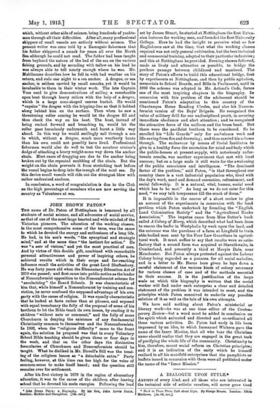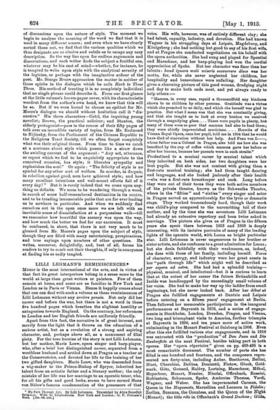DIALOGUE UPON STYLE.* Asmara of every kind, and all those
who are interested in the technical side of artistic creation, will never grow tired
• Bark Is These Mr. Talk .Lout Stale. By /Una Moan. London: B&W Mathews. Lla aa. nat.] of discussions upon the nature of style. The moment we begin to analyse the meaning of the word we find that it is used in many different senses ; and even when we have clearly sorted these out, we find that the various qualities which we thus designate are so elusive and subtle as to escape any easy description. So the way lies open for endless arguments and dissertations, and each writer finds the subject a fruitful one, whatever may be his cast of mind—whether, for instance, he is tempted to write upon style with the analytical severity of the logician, or perhaps with the imaginative ardour of the poet. Mr. Sturge Moore approaches the matter in neither of these spirits in the dialogue which he calls Hark to These Three. His method of treating it is so completely individual that no single phrase could describe it. From our first glance at the little volume's brown-paper cover, with its characteristic woodcut from the author's own hand, we know that this will be so. But if we were bound to choose en epithet for Mr. Moore's dialogue we should without hesitation call it "dis- cursive." His three characters—Oshil, the inquiring young novelist; Brown, the practical solicitor; and Stanton, the elderly protagonist—pass in the course of their fifty pages of talk over an incredible variety of topics, from Mr. Redmond to Nijinsky, from the Parliament of the Chinese Republic to the Religious Tract Society, till we often forget completely what was their original theme. From time to time we catch at a sentence about style which passes like a straw down the swirling current of the argument : "Any act, utterance, or report which we feel to be exquisitely appropriate to the conceived occasion, has style; it liberates sympathy and replenishes the soul." Or again: "The felicity of style is no symbol for any other sort of welfare. In murder, in despair, in rebellion against good, men bare thieved style ; and how many excellent intentions and well-meant efforts fail of it every day!" But it is rarely indeed that we come upon any- thing so definite. We seem to be wandering through a wood, in search of some half-remembered destination in its centre, and to be treading innumerable paths that are for ever leading us to nowhere in particular. And when we suddenly find ourselves out in the open once more we are left with an inevitable sense of dissatisfaction at a purposeless walk—till we remember how beautiful the scenery was upon the way, and how much the better we feel for our excursion. It must be confessed, in short, that there is not very much to be gleaned from Mr. Moore's pages upon the subject of style, though they are filled with many entertaining, perspicacious, and true sayings upon numbers of other questions. He writes, moreover, delightfully, and, beet of all, forces his readers to try to comb out their thoughts, if only in annoyance at finding his so sadly tangled.



































 Previous page
Previous page